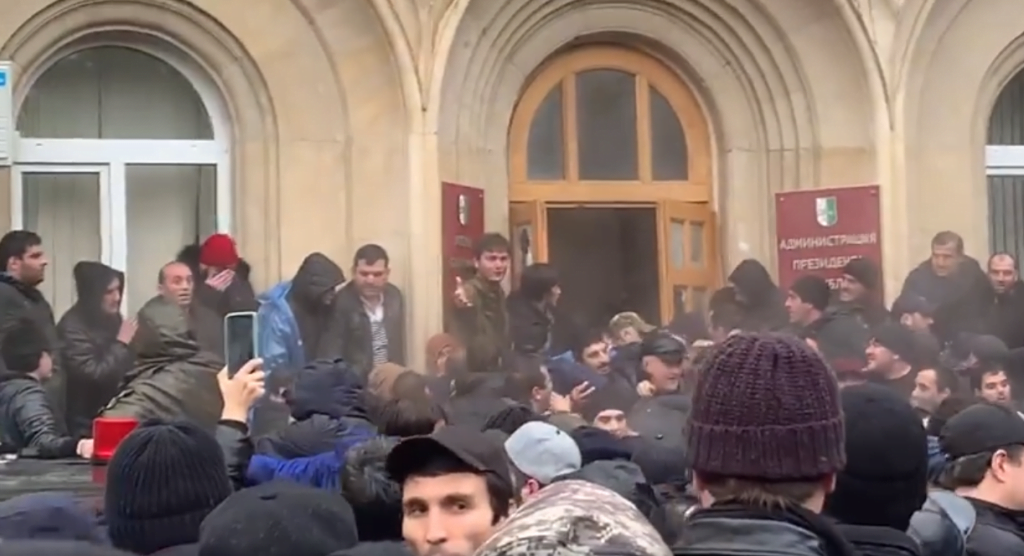Moscow-backed Abkhazia will hold repeat “presidential polls” on March 22, Abkhazia’s “election administration” announced on January 12.
The announcement comes two days after “the appeals chamber” of the “Supreme Court” ruled on Friday around 22:45 Tbilisi time, that the results of the ‘’presidential runoff” of September 8 were invalid. The outcome of the vote was disputed by an opposition leader Alkhaz Kvitsinia, who was runoff rival of incumbent leader Khajimba in September 2019.
Press office of region’s incumbent leader Khajimba said later on Sunday that the decision of “central election commission” was adopted based on illegal ruling of the “court”. Khajimba repeated his argument made in a statement of Friday, that the ruling was “illegal and ungrounded,” noting that he will challenge the “court” decision in “Presidium of the Supreme Court.”
Friday’s ruling was adopted amid protests in Sokhumi, Abkhazia’s capital. A day before, as the ‘court’ launched the hearings of Kvitsinia’s appeal, hundreds stormed and occupied Khajimba’s office. Khajimba denounced the events as an attempted coup.
- Top ‘Court’ Declares Results of Abkhaz ‘Presidential Polls’ Invalid
- ‘Parliament’ Calls on Abkhaz Leader to Resign, Khajimba Refuses
- Hundreds Storm Khajimba’s Office in Sokhumi, Demand New Polls
Shortly before the “court” declared its decision, Deputy Secretary of the Security Council of Russia, Rashid Nurgaliyev arrived in the occupied region. According to Khajimba’s office, Abkhaz leader met with Nurgaliyev on Friday and Saturday. According to the statement released after Saturday’s meeting, Nurgaliyev informed Khajimba about the meetings with the opposition representatives, where he noted that the processes should remain and proceed strictly within the frames of the law.
On Sunday afternoon, in an attempt to break Abkhazia deadlock, Russian security official mediated talks between Raul Khajimba and opposition’s Aslan Bzhania and Alkhas Kvitsinia. At a meeting held in Khajimba’s “official residence” Nurgaliyev called on Abkhaz leader, Kvitsinia and Bzhania to use all opportunities for a peaceful settlement of the tensions.
Raul Khajimba, graduated KGB’s academy in Minsk in mid-1980s, served in the KGB unit in the town of Tkvarcheli in Abkhazia before 1992. During the armed conflict in the region in 1992-1993, Khajimba served as chief of military intelligence on the eastern front. In late 1990s he was appointed as chief of state security service and then served as defense minister of the breakaway region since 2002 before being promoted by then Abkhaz leader Vladislav Ardzinba as prime minister in 2003. He served as breakaway region’s vice-president in 2005-2009. Khajimba took that post as a result of a power-sharing agreement with then Abkhaz leader Sergey Bagapsh following a fiercely disputed presidential election in 2004 in which Khajimba was openly supported by the Kremlin. In 2009 presidential election in which Bagapsh was re-elected, Khajimba was second with 15.4% of votes. In the 2011 election in which Alexander Ankvab won the presidency, Khajimba was third in the race with less than 20% of votes. In August 2019 polls, Raul Khajimba received 23.85% of the votes, while Alkhas Kvitsinia garnered 21.97%. Minister Ketevan Tsikhelashvili who oversees occupied regions stated on Saturday that the Sokhumi events demonstrate existing situation in Abkhazia and unresolved conflict in the region does not meet the demands and interests of the Abkhazian society. Tsikhelashvili says it is crucial that the situation does not escalate further. Georgian President Salome Zurabishvili tweeted on Thursday that she is “paying close attention to the events in Sokhumi and to the safety, fate and human rights of our citizens in occupied Abkhazia.” I am paying close attention to the events in Sokhumi and to the safety, fate and human rights of our citizens in occupied Abkhazia. — Salome Zourabichvili (@Zourabichvili_S) January 9, 2020 Georgia and most of the international community consider Abkhazia as part of Georgia and do not recognize elections in the region. In August, Georgian President Salome Zurabishvili called Abkhaz “presidential polls” as illegitimate, dubbing it a “sham process.” This post is also available in:
ქართული (Georgian) Русский (Russian)Reactions from Tbilisi

